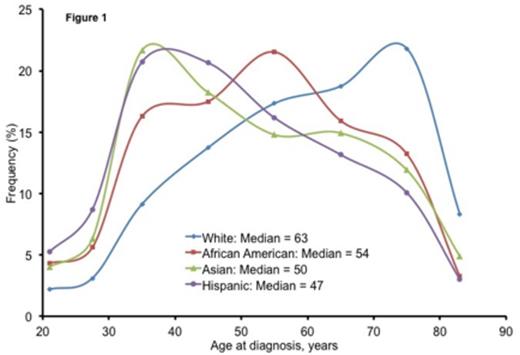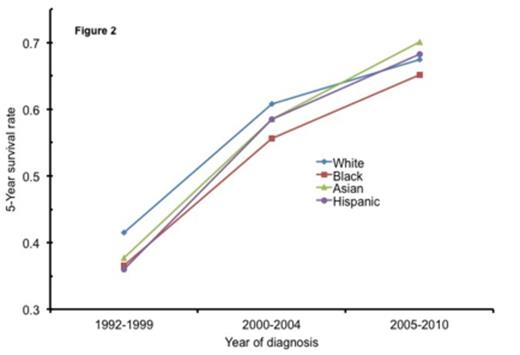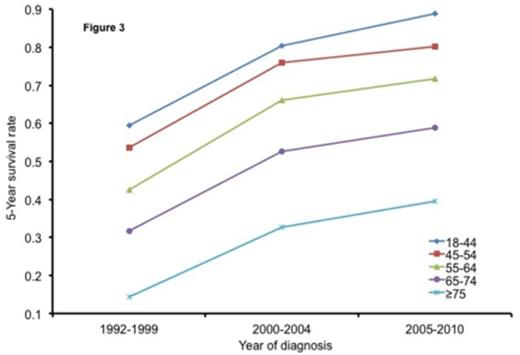Abstract
Outcomes for patients with chronic myeloid leukemia (CML) have improved in recent years. Nonetheless, survival disparities persist between various patient subgroups. There have been limited reports of ethnic variations in CML outcomes, with limited data on ethnic minorities (Hispanics and Asians), who are the fastest growing ethnic subgroups in the Unites States. We undertook a large Surveillance Epidemiology and End Results (SEER) based analysis to describe outcome disparities in different subgroups of CML patients, with a specific focus on various ethnicities.
SEER 17 Registry data (1973-2010) was utilized. Adult (>18 years) patients with confirmed diagnosis of CML were eligible. To avoid bias of under representation by ethnic minorities, analysis was restricted to patients with a diagnosis date of 1992 or later (SEER expansion). Cases that received a diagnosis at death certificate/autopsy, no follow-up records, or lacking age at diagnosis, sex, or race/ethnicity documentation were excluded. Cox proportional hazards models, adjusted for confounding variables, were used to evaluate association between patient characteristics and overall survival (OS). All statistical tests were two-sided with a significance level of 0.05, utilizing the SAS software (v9.2).
The final analysis included 10,356 CML patients (5,943 males; 57.4%, 4,413 females; 42.6%). Age group cohorts included: 18-44 years (2,592; 25%), 45-54 years (1,706; 16.5%), 55-64 years (1,817; 17.6%), 65-74 years (1,876; 18.1%), and ≥75 years (2,365; 22.8%). Patients were stratified by race/ethnicity: White (7,292; 70.4%), African-American (AA) (1,143; 11%), Hispanic (1,163; 11.2%), Asian (697; 6.7%), and Native American (61; 0.6%). For survival analysis, Native Americans were excluded due to their small numbers. Patients were also stratified based on year of diagnosis (1992-1999, 2000-2004 and 2005-2010) to study the impact of evolving therapeutics on CML outcomes. Median age at diagnosis was significantly different among ethnicities (p<0.001) with Hispanics the youngest (47 years) and Whites the oldest (63 years) (Figure 1). There were more Hispanic and AA CML patients reported in recent years in the database than those in 1992-1999 or 2000-2004 (p<0.001). Survival analysis revealed that for all patients, females had a significantly better median OS than males (7.8 years vs. 6.4 years; p<0.001). Among the different age cohorts, median OS got progressively worse with increasing age at diagnosis (p<0.001), with a median OS of 15+ years in 18-44 year cohort vs. 2.3 years in patients ≥75 years. Patients diagnosed more recently had a better median OS (1992-1999: 4.5 years vs. 2000-2004: 7.7 years vs. 2005-2010: 9.8 years; p<0.001). AA had the worst median OS among all ethnicities, which was significantly worse than Whites (reference) (5.8 years vs. 7.4 years; p<0.001). Asians had a median OS of 6.4 years and Hispanics 6 years. In a multivariate model using race, age at diagnosis, year of diagnosis, sex and marital status, a significant interaction was noted between year of diagnosis and race, with all racial subgroups showing improvement in 5-year survival in more recent time periods (p=0.001) (Figure 2). A significant interaction was also noted between year of diagnosis and age, with a progressive improvement in 5-year survival noted across all age groups in more recent years (p<0.001) (Figure 3).
We present a population-based study of outcomes in CML with the largest representation of ethnic minorities reported so far. We noted a higher number of AA and Hispanic patients reported to the SEER database in recent years. Hispanic patients had a significantly younger age at diagnosis, which could mean longer treatment duration over the lifetime of a patient. AA patients had the worst median OS among all ethnicities, although all ethnicities and age groups were noted to have progressive improvement in outcomes in more recent years of diagnosis. The incremental benefit in outcomes was seen most for Asians and least for Whites. These results will help in better understanding of ethnic influences on disease biology and clinical behavior as well as optimal triaging of healthcare resources.
Off Label Use: The abstract shows scientific information on SAR245409 which is an investigational product developed by Sanofi. This investigational product is not approved by any health authority for any indication.
Author notes
Asterisk with author names denotes non-ASH members.




This feature is available to Subscribers Only
Sign In or Create an Account Close Modal